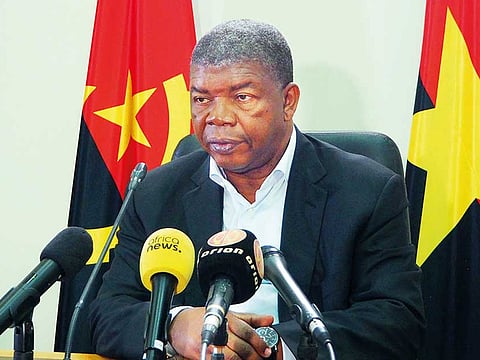Lourenco to take power in Angola as MPLA wins election
The partial results from Wednesday’s vote account for two-thirds of all polling stations

Luanda: Angola’s ruling MPLA won this week’s election, a poll official announced Thursday, with party candidate Joao Lourenco now set to succeed President Jose Eduardo Dos Santos who has ruled for 38 years.
An election commission official in Luanda said the People’s Movement for the Liberation of Angola (MPLA) had won just over 64 per cent of the ballot.
The partial results from Wednesday’s vote account for two-thirds of all polling stations, with the MPLA building an unassailable lead over its rivals.
The party, which has ruled since Angola’s hard-fought independence from Portugal in 1975, had predicted an easy victory, but the outcome indicated a fall in its support since the previous election in 2012.
Dos Santos, a secretive and much criticised leader who announced his retirement earlier this year, hand-picked veteran party loyalist Lourenco, 63, as his successor.
Lourenco, until recently defence minister, has vowed to boost foreign investment and said he wants to be recognised as a leader who brought an “economic miracle” to the southern African country.
He is expected to formally assume power next month.
The two main opposition parties, UNITA and Casa-CE, immediately alleged that the vote count was flawed.
“We have results different from those announced,” UNITA representative Estevao Jose Kachiungu told reporters.
“It is impossible in the current Angola that the MPLA wins in all provinces with such a gap.”
Opposition leaders earlier complained they had been deprived of media access and that voters in opposition strongholds were forced to cast their ballots at polling stations far from their homes.
UNITA took 24 per cent of the votes and Casa-CE 8.5 per cent, according to the partial results.
The two parties had hoped to tap into public anger over inflation that peaked at over 40 per cent last year, as well as low growth and high unemployment.
Despite being rich in oil and diamonds, Angola remains one of the poorest countries in the world and one of the most closed societies on the African continent.
“These preliminary results suggest that the MPLA is on course to win a majority again,” Alex Vines, of the Chatham House think tank in London, told AFP.
“It will politically strengthen president-elect Joao Lourenco. Angola’s economy is in crisis and he needed a strong mandate to deal with it.”
Before the results were released, the MPLA’s central committee spokesman Joao Martins declared in the local media that the party’s victory was “unequivocal and virtually unavoidable”.
Dos Santos’s long reign saw the end of Angola’s bloody civil war between 1975 and 2002 and a post-conflict investment boom as the country exploited its oil reserves.
But the 2014 slump in crude prices hit the country hard.
“I am waiting for things to change, for more work, more schools, more hospitals and everything else,” MPLA supporter Rosaria Almeida said as she cast her ballot on Wednesday.
The MPLA, which won 72 per cent in the 2012 election, funded a recent rush of infrastructure projects, apparently to shore up support levels among Angola’s 9.3 million registered voters.
Dos Santos has been dogged by reports of illness, with his regular visits to Spain for “private” reasons fuelling criticism that the state of his health was being hidden from ordinary Angolans.
Earlier this year, his daughter Isabel — who has become a billionaire and Africa’s richest businesswoman under his rule — was forced to deny rumours that he had died in Spain.
At a weekend rally in front of thousands of party supporters, Dos Santos, a frail-looking 74, made a brief appearance to endorse Lourenco.
Amnesty International called for Angola’s next leader to “guide the country out of the spiral of oppression” and castigated Dos Santos’s “appalling human rights record”.
Critics often accuse him of ruthlessly suppressing dissent and enriching his family and the ruling elite.
Dos Santos is to remain MPLA party chief, and new laws passed last month have limited the unfettered presidential power he enjoyed.
Sign up for the Daily Briefing
Get the latest news and updates straight to your inbox



